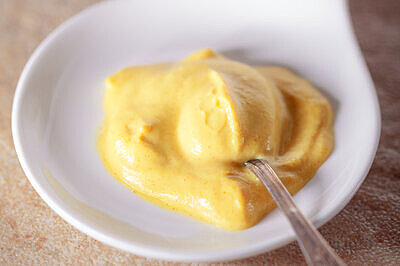Mayonnaise

Mayonnaise is a popular and versatile sauce made from egg yolk, oil, mustard, lemon juice and spices. It tastes delicious with chips, salads, sandwiches and much more. But what about mayonnaise and dogs? Can your four-legged friend enjoy this sauce or is it harmful to them? In this article, you'll find out everything you need to know about mayonnaise in relation to dogs.
What is mayonnaise?
Mayonnaise is an emulsion of egg yolk and oil, which is seasoned with mustard, lemon juice and spices such as salt, pepper and sugar. The egg yolks contain lecithin, which acts as an emulsifier and ensures that the oil combines with the water in the egg yolk. Stirring or mixing vigorously produces a creamy and glossy sauce.
You can buy ready-made mayonnaise or make it yourself. For homemade mayonnaise, you need fresh eggs at room temperature, a neutral-tasting oil such as sunflower or rapeseed oil and a whisk or hand blender. The oil must be added to the egg mixture very slowly and in a thin stream so that the mayonnaise does not curdle. If the mayonnaise is too thick, you can dilute it with a little water or lemon juice.
Benefits of mayonnaise for dogs
Mayonnaise contains several nutrients that can be healthy for dogs. These include:
- Protein: protein is an important building block for dogs' muscles, coat, skin and immune system. Egg yolk is a good source of high quality protein that contains all the essential amino acids.
- Fat: Fat provides energy and supports the absorption of fat-soluble vitamins such as A, D, E and K. Fat is also important for the function of dogs' nerves and brain. Oil is a good source of unsaturated fatty acids, which can have an anti-inflammatory effect.
- Vitamins: Mayonnaise contains several vitamins that are important for dogs. These include vitamin A, which is important for vision and skin health, vitamin D, which is important for bone formation and the immune system, vitamin E, which acts as an antioxidant and protects cells from damage, and vitamin K, which is important for blood clotting.
- Minerals: Mayonnaise also contains some minerals that are important for dogs. These include calcium, which is important for bones and teeth, iron, which is important for oxygen transport in the blood, phosphorus, which together with calcium is important for bone formation, and zinc, which is important for wound healing and the immune system.
Disadvantages of mayonnaise for dogs
However, mayonnaise also has some disadvantages for dogs. These include:
- Calories: Mayonnaise is very high in calories and can lead to overweight and obesity in dogs. One tablespoon of mayonnaise contains about 90 calories, which is about 10% of a small dog's daily calorie requirement. Obesity can lead to various health problems in dogs, such as diabetes, arthritis or cardiovascular disease.
- Salt: Mayonnaise contains a lot of salt, which can lead to increased blood pressure and a disturbed fluid balance in dogs. Too much salt can also lead to intoxication in dogs, which can be manifested by vomiting, diarrhea, tremors, convulsions or coma. One tablespoon of mayonnaise contains about 80 mg of sodium, which is about 4% of a small dog's daily sodium requirement.
- Sugar: Mayonnaise also contains some sugar, which can lead to increased blood sugar levels and impaired insulin production in dogs. Too much sugar can also lead to tooth decay or gingivitis in dogs. One tablespoon of mayonnaise contains about 0.5 g of sugar, which is about 2% of a small dog's daily sugar consumption.
- Bacteria: Mayonnaise can also contain bacteria that can be harmful to dogs. These include salmonella, which can be found in raw egg yolks and can lead to gastrointestinal infections in dogs. Salmonella can also be dangerous for humans if they come into contact with the mayonnaise. This is why you should always use fresh eggs and keep the mayonnaise in the fridge.
Mayonnaise is a tasty sauce made from egg yolk, oil, mustard, lemon juice and spices. It contains some nutrients that can be healthy for dogs, such as protein, fat, vitamins and minerals. However, it also has some disadvantages for dogs, such as calories, salt, sugar and bacteria. Therefore, mayonnaise should only be fed to dogs in moderation and as an occasional treat. Too much mayonnaise can lead to obesity, high blood pressure, diabetes or infections in dogs.
If you notice any signs of hypersensitivity or poisoning in your dog, you should see your vet immediately. We are not a substitute for a vet, but we try to be as accurate as possible. Every dog reacts differently and we recommend you get a second opinion or consult your vet if in doubt.
Stay healthy and take good care of your four-legged friend!😊
Similar to Mayonnaise
What is ketchup? Ketchup is a thick sauce that originally comes from China. There it was made from fermented fish sauce. Over time, the recipe was changed and adapted to different tastes. Today,...
Mustard is a plant that belongs to the cruciferous family. The plant has green leaves, known as mustard greens, and yellow flowers from which small seeds develop. The seeds are dried and ground to...
Relish is a tangy, often sweet and sour garnish traditionally made from finely chopped vegetables or fruit, vinegar, sugar and various spices. There are many variations, including cucumber relish,...
Eggs are the fertilized or unfertilized egg cells of birds, usually chickens. They consist of a shell, an egg white and an egg yolk. Eggs contain many nutrients such as proteins, fats, vitamins and...



